Industrial Applications of Shape Memory Alloys – Potentials and Limitations
Konferenz: Innovative Small Drives and Micro-Motor Systems - 9. GMM/ETG-Fachtagung
19.09.2013 - 20.09.2013 in Nürnberg, Deutschland
Tagungsband: Innovative Small Drives and Micro-Motor Systems
Seiten: 6Sprache: EnglischTyp: PDF
Persönliche VDE-Mitglieder erhalten auf diesen Artikel 10% Rabatt
Autoren:
Bucht, André; Pagel, Kenny; Eppler, Christoph; Kunze, Holger (Fraunhofer Institute of Machine Tools and Forming Technology, Dresden, Germany)
Inhalt:
Shape Memory Alloys are well known and established in medical engineering. In recent years their importance considering industrial applications also increased. Especially the high specific work load of the material and the simple working principle of SMA actuator systems possess them to be a suitable alternative to conventional drives. The benefits of the technology directly address the main demands on actuator technologies like miniaturisation, lightweight design and costs. Further SMAs can be an alternative to substitute rare earth metals. In the paper we present the status quo of SMA technology. The shape memory effect as a basis for understanding the working principles of such actuators is described. Beyond that mechanical design rules are explained. That covers the three possible actuating principles constant- and spring loaded and antagonistically arranged SMA actuators. Besides simple switching applications, there are rather complex controlled SMA actuators using external sensors or inherent resistance feedback. Control principles for both approaches are presented. To show potentials but also the limitations of SMA actuators, applications from different markets with different demands are described. They specify the certain challenges which have to be overcome before a comprehensive market acceptance of SMAs in industrial applications can be expected. The estimated developments in the future will be discussed further.


